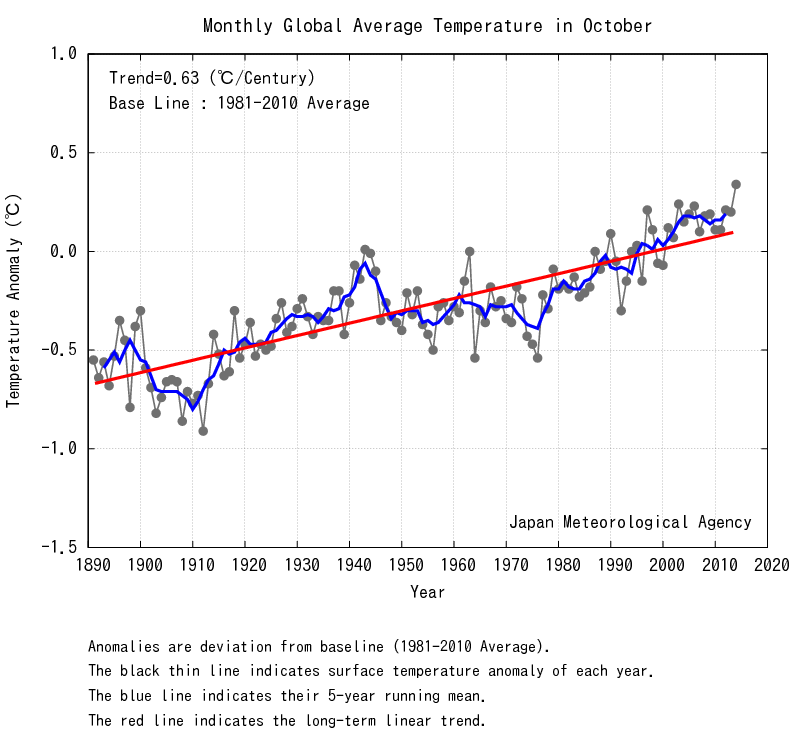
15th November 2014 Hottest October on record A new global temperature record for October has been set, according to data from the Japan Meteorological Agency (JMA).
Globally, last month was the hottest October on record – by far – according to data just released by the Japan Meteorological Agency (JMA). This follows the hottest March–May, June, August and September, also recorded this year. Near-surface land and sea surface temperatures were 0.67°C (1.2°F) higher than the 20th century average. Despite oft-repeated claims of a "pause", it seems increasingly likely that 2014 is on course to be the all-time hottest year since the JMA began record-keeping in 1891. Data from the National Oceanic and Atmospheric Administration (NOAA) – the U.S. equivalent of Japan's agency – presents a similar trend, with October 2013 to September 2014 being the warmest 12-month period among all months since 1880. These records have occurred even without the latest El Niño, which has yet to begin, meaning that 2015 could be even hotter. The Intergovernmental Panel on Climate Change (IPCC) has just released the final part of its Fifth Assessment Report. This further discusses the future impacts of climate change and – it is hoped – will pave the way for a global, legally binding treaty on carbon emissions at the UN Climate Change Conference in Paris during late 2015. This week in Beijing, Chinese President Xi Jinping met with Barack Obama to announce a "historic" agreement that would see U.S. emissions fall 26%-28% below 2005 levels by 2025, while China's would peak by 2030. By announcing these targets now, they hope to inject momentum into the global climate negotiations and inspire other countries to join in coming forward with ambitious actions as soon as possible, preferably before the first quarter of 2015. The two Presidents resolved to work closely together over the next year to address major impediments to reaching a successful treaty in Paris. UN climate chief, Christiana Figueres, said: "These two crucial countries have today announced important pathways towards a better and more secure future for humankind." Unfortunately for Barack Obama, the U.S. midterm election was a disaster for the Democrats. They will now lose control of the Senate, for the first time since January 2007, with Republicans also increasing their majority in the House. The incoming Senate Majority Leader, Mitch McConnell, stated that his top priority is to "get the EPA reined in" and to dismantle the new emissions rules for coal power plants. In a related development, the controversial Keystone XL was approved yesterday with a 252-161 vote. This 875-mile (1,408 km) pipeline will carry tar sands oil from Alberta, Canada, to the US state of Nebraska where it joins pipes running down to Texas. While creating only 35 permanent jobs, it will transport 51 coal plants' worth of CO2 and do nothing to lower U.S. gas prices. Meanwhile, the G20 summit now underway in Brisbane, Australia, has seen hundreds of people staging a "head in the sand" protest over the lack of discussions on climate change. Australian Prime Minister, Tony Abbott, recently declared that "coal is good for humanity" while opening a new coal plant and expressing his belief that "the trajectory should be up and up and up in the years and decades to come ... The future for coal is bright." A new report from the Overseas Development Institute (ODI) and Oil Change International highlights the fact that G20 governments are now spending almost £56bn ($90bn) a year on finding new oil, gas and coal reserves. This is despite clear evidence that two-thirds of fossil fuels must be left in the ground to avoid tipping the world into a climate catastrophe. Phasing out these perverse subsidies may form a crucial part of the negotiations at the Paris conference in 2015. The science of global warming is clearer than ever. Back in April, a report by McGill University concluded "with confidence levels greater than 99% and most likely greater than 99.9%" that recent warming is not caused by natural factors but is man-made. A new generation of supercomputers – able to crunch hundreds of terabytes' worth of data – has led to what one researcher calls "a golden age for high-resolution climate modelling" with accurate simulations of intense weather and climate events. These models will only get better in the years ahead. On current trends, it should be possible to achieve resolutions down to a square metre by 2030. And yet, even without these models or the IPCC, we know the problem is real.
Comments »
|







